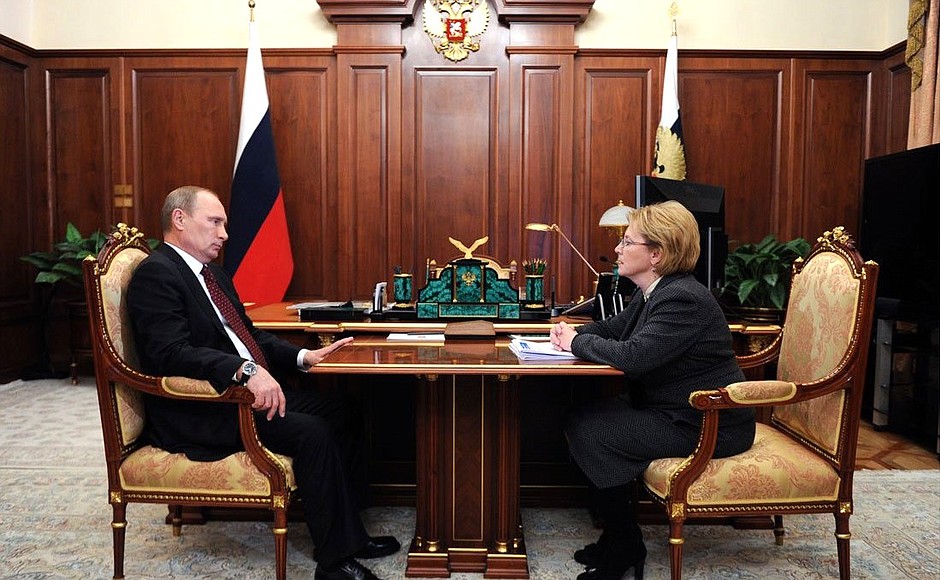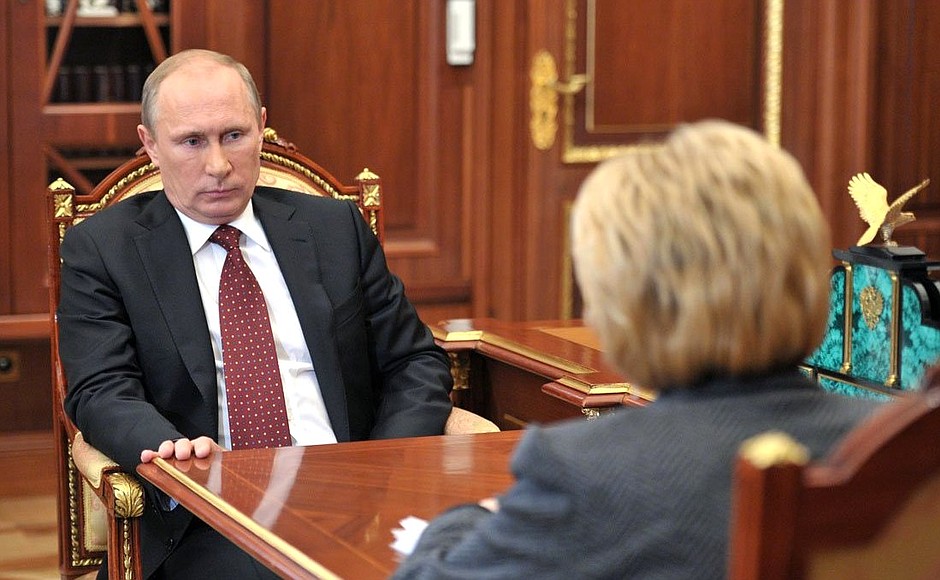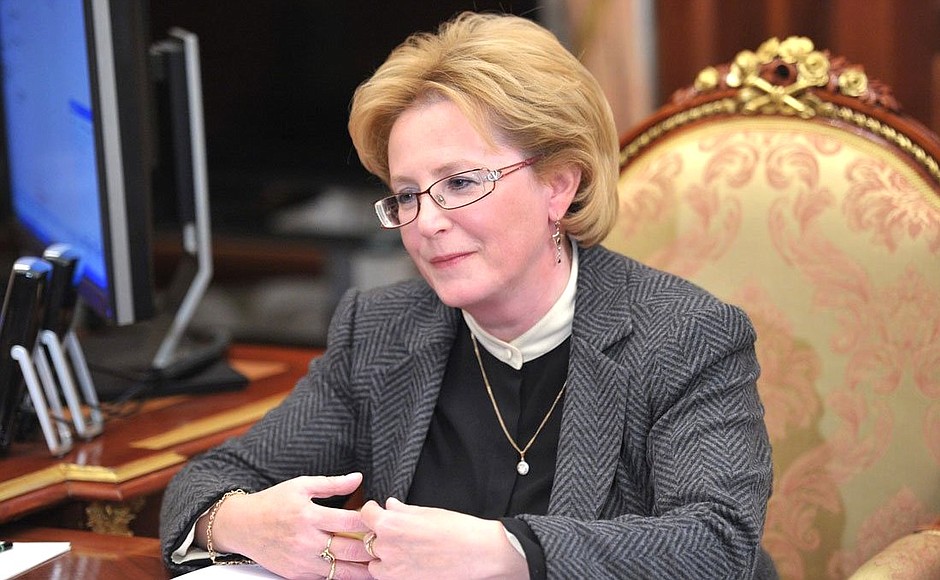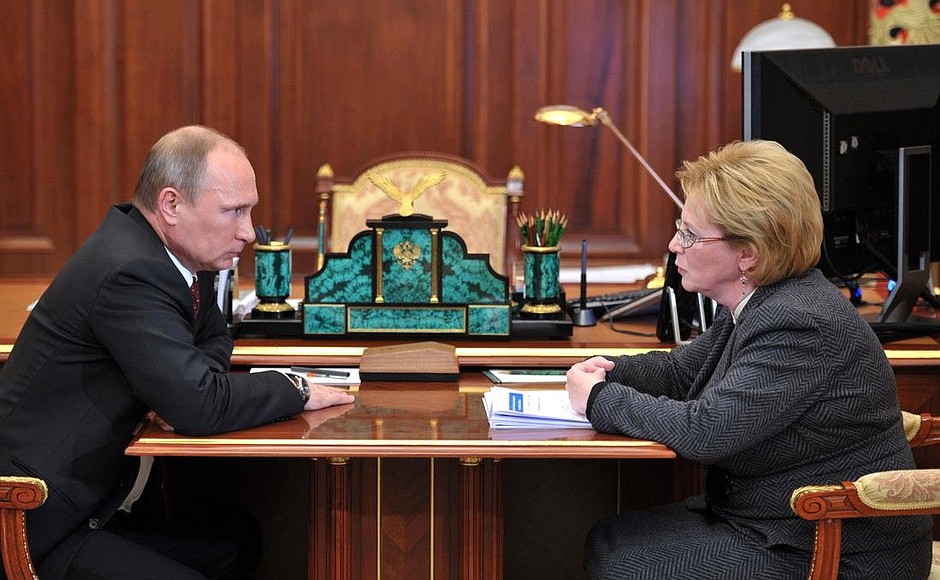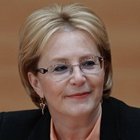President of Russia Vladimir Putin: Ms Skvortsova, good afternoon. The budget has been prepared, and I know that this required a lot of hard work. Your department was involved, together with the Finance Ministry and other colleagues.
Naturally, the question of how to fund social services always comes up. In your opinion, how are the needs of the healthcare sector reflected in the 2014 budget and that through to 2016?
Healthcare Minister Veronika Skvortsova: Mr President, I can report that the health sector’s budget is balanced. And despite a tense situation overall, 70 billion rubles [more than $2 billion] in additional funding has been allocated for healthcare compared to 2013.
These funds will be enough to ensure that we do not simply carry on, but also develop all major programmes currently underway. They will also allow us to raise salaries for all medical personnel in accordance with our improvement targets.
In 2015 funds will increase by another 100 billion rubles [more than $3 billion]. We have reviewed all programmes to ensure that they will develop harmoniously. Programmes include primary healthcare, preventive care and examinations, and all types of specialised care for both adults and children. We hope to increase the amount of high-tech medical services provided.
Vladimir Putin: You just mentioned preventive medical examinations. This debate has been going on for a long time now. In and of itself a preventive medical examination is undoubtedly good, but the question is always: what next?
Veronika Skvortsova: Mr President, this year we very consciously conducted mass medical examinations. Although we only have the preliminary results, for the first time in recent years we examined 16.7 million people – 10 million adults and 6.7 million children – during this period.
Moreover, we have changed the structure of these routine check-ups, and introduced a two-stage clinical examination procedure. After extensive screening, we bring about a quarter of patients back for the second phase, using methods such as endoscopy, computed tomography (CT), magnetic resonance imaging (MRI), advanced ultrasounds, and laboratory tests. All of this is both free and informal.
The most important task is to identify those groups of citizens who require preventive treatment, and ensure that no less than 60 percent of them receive it.
Based on representative samples, today we can say that more than 30 percent of our citizens are healthy, with virtually no dangerous risk factors, while more than 40 percent of adults have at least one chronic disease and require on-going monitoring and treatment.
But we are paying special attention to another group composed of healthy people without confirmed diseases, about 26 percent of the population. These people have many risk factors that can be dangerous, and even induce sudden death during the next ten years.
Working with this group will allow us to reduce mortality by 45 to 50 percent. We are currently focusing our efforts on ensuring that every single person who undergoes a preventive medical examination receives follow-up care. Moreover, that the main indicators reflecting the state of their health continue to be monitored.
We made a very important conclusion while examining Russian children. We examined all orphans, more than 300,000 people, and a general mass of children of different ages. Today we can say that our children’s health has improved over the past decade. 74 percent of children are classified within medical groups 1 and 2 (composed of healthy children and those with mild impairments that are definitely reversible). This is positive, because 24 percent of children are healthy, and 50 percent have some disorder, but one that we can treat with health precaution measures, so that they can stay healthy and become healthy adults.
The situation regarding orphans is somewhat worse. The number of children in medical groups 1 and 2 is only 43 percent. This is a very important signal for us, and we have developed individual rehabilitation programmes and treatment for each child we examined. We will continue to monitor this very attentively.
Vladimir Putin: You started to talk about children. We recently recorded positive demographic trends. How does the situation look today, and what is your prognosis?
Veronika Skvortsova: I would like to share that in August we significantly decreased mortality in all major categories: total mortality by 4.6 percent, from vascular diseases by more than 7 percent, from road traffic accidents by 15 percent, and the infant mortality rate fell by nearly 20 percent.
These improvements, which we already reported to you in July, continued throughout August. They contributed to the fact that data from the past eight months has allowed us to already reach the target improvements that, according to our so-called road map, we should be reaching by December 2013.
At present we have reduced the mortality rate to 13.2 per 1,000 people, taking into account the fact that our birth rate has remained constant. It’s been a few months since our birth and death rates crossed, but we have not yet reached the crucial next step when our population starts to grow. We are just working in a hands-on way with each region, and look forward to seeing the next phase start.
Vladimir Putin: Good. In more than half of Russian regions funds for a third child reach families. Hopefully this will also act as an effective way to increase fertility.
Veronika Skvortsova: We very much hope so and are actively working together with the Labour Ministry, and helping each other.
< … >
